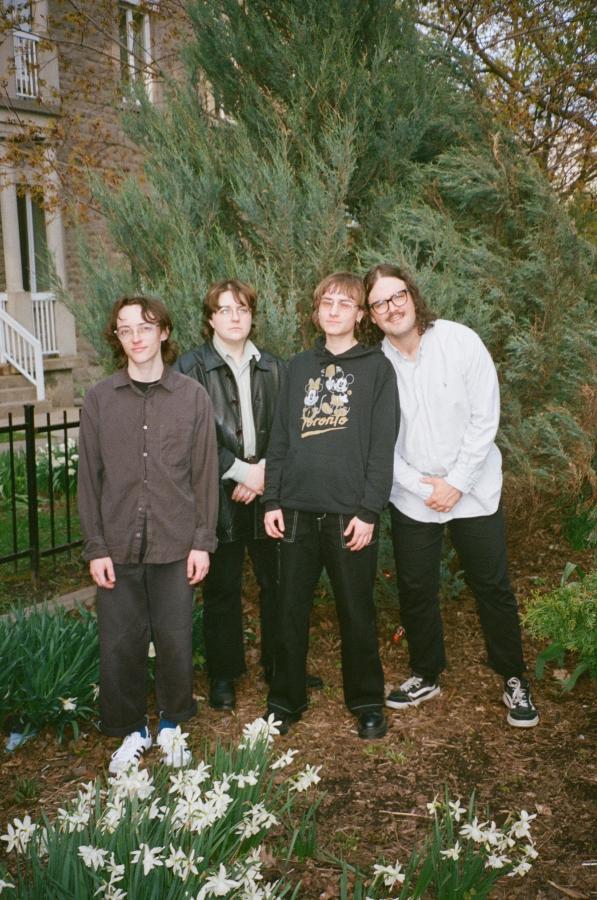RSS
Foster the People kick things up at MTelus

The crowd roared as the lights dimmed and the stage filled with haze, welcoming Foster the People on stage. After a 7-year absence from the city, the band was back in Montreal’s MTelus to promote their newest album Paradise State of Mind.
Founded in 2009 by Mark Foster and drummer Mark Pontius, the band initially went by the name Foster & The People. People misheard the name as Foster the People, but it stuck ever since. The indie-pop band caught the attention of the masses in 2010 with their viral and breakthrough song “Pumped Up Kicks”.
“Helena Beat”, “Take Me Back”, “Coming of Age”, “Houdini” and “Sit Next to Me” brought the summer vibes back to the city in the middle of what seems to be a never-ending winter. Mixed in was the nostalgia of the band performing songs from their four studio albums, old and new.
The band offered a true light show both on stage and throughout the venue. With a light setup placed behind them, graphics and lyrics that matched the songs were displayed on them. The lyrics of the chorus of “Call It What You Want” and “Don’t Stop (Color on the Walls)” were projected, emphasizing them. “Lamb’s Wool” and “A Diamond To Be Born” felt like a mesmerizing, out-of-body experience paired with a string of light being projected onto the ceiling.
From "See You In The Afterlife" to "Glitchzig", Foster The People demonstrated versatility in their new album but also as artists.
Sat in seat D19 on the balcony, I had a perfect view of the stage. Foster showed a strong stage presence, but he could’ve interacted more with the crowd. My spot also allowed me to see the people in the front row roaring with energy throughout the night; however, that energy didn’t seem to translate to those above seated.
The band closed the night with their viral hit “Pumped Up Kicks”. The pumped-up energy could be felt throughout the venue (even on the balcony), ending the night on a high.
CJLO X SXSW: Rock Music Preview

The CJLO music team is headed back to Austin, Texas, for SXSW 2024 in just a few weeks! This is my first year as Head Music Director and my first year attending the festival, so I am beyond excited about all the bands I’ll be seeing.
With that, I have scoured the SXSW websites and playlists to bring you the best the festival has to offer, with my personal bias to indie rock (you can read my colleagues' articles for their picks from the world of Hip Hop and international music). Starting local, Montreal is bringing an incredibly stacked lineup across multiple showcases. I promise this is not out of bias or a need for local repping, but the calibre of acts our city is bringing is unparalleled. Starting out the night the CJLO touches town in Austin on March 11th, Mothland Records x Exclaim! Magazine x Project Nowhere are showcasing station favourites such as folk-inspired hardcore act Truck Violence, the post-rock Yoo Doo Right, and arty darkwave from Slash Need.
The next day, March 12th, Pop Montreal x M for Montreal will be collaborating on an indoor/outdoor show. This showcase spans language and genre and includes post-punk by Ribbon Skirt and Alix Fernz, indie rock from Knitting and Population II, folk from Billianne and Clerel, and more.
Now, while I would be fully satisfied to just watch Montreal bands all week, that’s not why CJLO pays me the big, campus non-profit, bucks. I have to network, schmooze with some Americans, and eat my first decent taco in over a year of not being back in the United States!
So, other bands on my schedule include the dream pop duo, based in Austin, Daydream Twins. The title track of their brand new album Solstice For Embodiment hit me like a ton of bricks when I first gave it a listen. So, even though they are set to play at 1:00 AM the night I fly in, I’m getting myself to that showcase. I am also excited to see Brooklyn duo fantasy of a broken heart, whose catchy psych-pop album Feats of Engineering has been on repeat for me since it came out last fall. I also hope to catch Hiding Places, whose slacker alt-country really appeals to me through the few EPs they’ve dropped. Additionally, I’ll try to catch Wishy, whose 2000s-inspired indie rock garnered them a ton of critical acclaim for their debut LP Triple Seven from last year.
It’s a lofty, probably impossible, goal to try to catch all these shows once we’re down in Austin. Follow along at @cjlomtl on Instagram to see everything we hit!
Aviva Majerczyk is the head music director at CJLO 1690AM. She is also the host of The Alley, a folk-rock show airing Fridays at 11:00 AM.
Faux Real gets ready sweaty with art-pop pilates at Foufounes Electriques
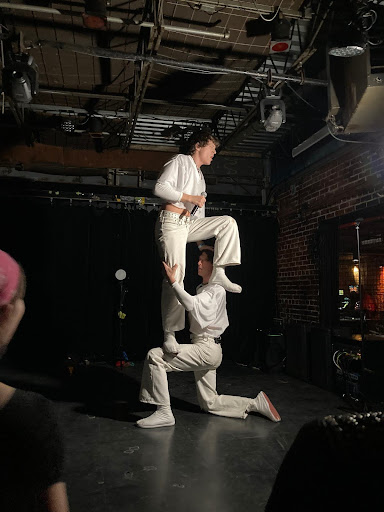
High-energy Franco-American art-pop brother duo Faux Real graced the floors of Foufounes Electric with their toe shoes this week with openers Lola 1:2 and Sean Nicolas Savage.
Lola 1:2 is a fresh Montreal popstar with one released single and a sense of perfectionism holding back the rest of her set. Lola’s performance was energizing and fun, she ran circles around the stage while effortlessly untangling herself from the microphone cord. She struggled with her new sampler machine and explained to us that she hadn’t performed since October, I wouldn’t have known as it all sounded so cool. After announcing that she had one more song she spotted her friend in the audience who just arrived, “oh, okay I’ll do two more songs”, everyone cheered, “do you want trippy or emo?”, “trippy!!” the audience responded.
Recovering from a health scare of almost-chopping-off-the-tip-of-his-finger-while-chopping-tomatoes-the-night-before Sean Nicolas Savage was so happy to be alive and well on stage with his fingers intact. His smiles and energy were big and wide and shining, twirling around on stage and again, untangling from mic cords. He has a new album coming this spring, from which he opened with the song ‘The Awakening’ which he described as something like a spell, as this is the time for spells. The energy of his performance and vocals, almost Caroline Polachek-ish, blew away the slow acoustic melodies of the music behind him. Although he filled the empty stage well, my ears did not feel saturated with sound to the degree he deserved. But what can I say, I’m a maximalist and not one for piano ballads.
Faux Real’s performance was more polished and annotated than when I saw them open for Cecile Believe at POP Montreal last October. Maybe they’re just tired from all the high kicks as this show wrapped up their North American tour leg, or they feel more confident in their music’s ability to capture an audience without an entire Pilates class. Their high-intensity performance is mesmerizing to watch, every move is analytically choreographed and practiced from switching coloured covers on stage lights to rugby-inspired moves of flinging each other into the air. The level of physical exertion they put out is really impressive, and they continually lose pieces of clothing as the show goes on, but the toe shoes stay on. The brothers are really good at using up every bit of space on the stage and when that's not enough they come into the pit with the audience, which is really fun until I’m worried I’m going to get hit in the head from a lightbulb on a rope getting spun around.
The brothers were very excited to be back in Montreal, the use of Franglish makes it feel like home, and they love the snow. “We’ve never spent this much time in Canada” they told me, but they’re excited to continue their tour in Europe.
SXSW Preview: An interview with Alicia Clara
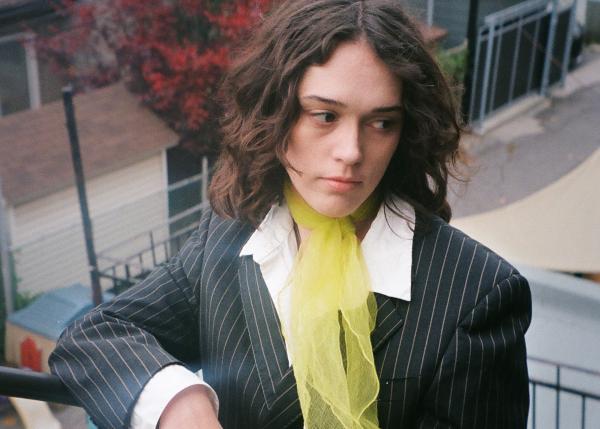
CJLO head music director Aviva talked with local singer-songwriter Alicia Clara ahead of her performance at the Women in Music Canada showcase at this year's SXSW. Clara discusses songwriting during the pandemic, desires for the future of Montreal music, her new single "Nothing Dazzled," returning to Austin, and more.
SXSW Preview: An interview with Gloin

CJLO program director Cam talked with John Watson, Vic Byers, and Simon Kou of Gloin about their love of live music, their new album All of your anger is actually shame (and I bet that makes you angry) which drops March 28th, and their upcoming trip to SXSW.
If you are in Montreal, you can catch their album release show on May 2nd at La Toscadura.
Listen to CJLO's live coverage of SXSW at 1pm EST on March 12th, 13th, and 14th.
SXSW Preview: An interview with Alix Fernz
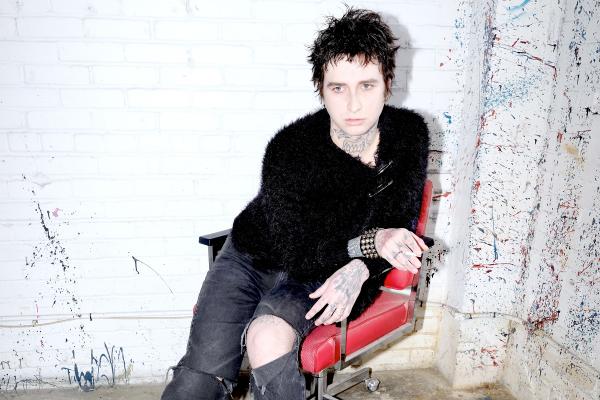
CJLO program director Cam spoke to Alix Fernz about stage presence, his forthcoming album, and his upcoming trip to SXSW.
If you are in Montreal, you can catch him performing alongside Kap Bambino at the SAT this Friday, March 7th.
Listen to CJLO's live coverage of SXSW at 1pm EST on March 12th, 13th, and 14th.
Neriah at Petit Campus: “How an Intimate Venue can Turn into a Living-Room Sing-Along with Your Favorite Artist .”
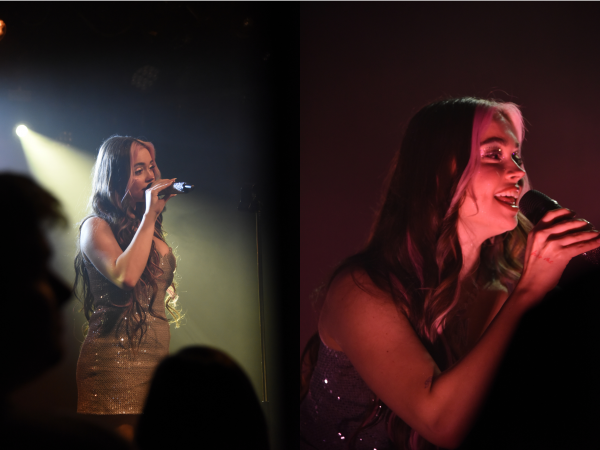
Sunday, March 2nd offered Montreal’s Petit Campus a break from their usual shoulder-to-shoulder, hectic crowd. LA-born singer Neriah stopped into the venue while on her first-ever headline tour, The Unfinished Business Tour, and was met by an intimate gathering of fans.
The 25-year-old pop singer-songwriter supported Madison Beer on the West Coast portion of her Spinnin Tour last year and has since been on a speedy trajectory. The young star has been recognized by some of her acclaimed inspirations in the industry, such as SZA and Ashe. With the release of 3 complete studio albums and a basket full of singles, Neriah has grown a loyal following over the last four years, a handful of which attended her March 2nd show.
At first glance, the venue’s emptiness emits an unsettling quiet. It was almost as if there was an unspoken understanding that yes, on this frigid, Sunday evening, there was a lack of brave soldiers who’d make it to the performance. It was unfortunate that the setting had not filled up to its potential, however, the intimacy of this event gave fans a truly personal musical experience.
Jordyn Sugar, a 21-year-old Torontonian artist, opened the show with what she describes as her “empowered pop” style. Audience members swayed along to Sugars’ performance however there was a clear lack of connection listeners held to her sound. While unfamiliarity often sparks newfound musical interests, Sugars’ set unfortunately did not spark such engrossment. The singer played her original music which held a more youthful tone in comparison to the later maturity of Neriah’s set. By such standards, Sugars’ songs were not suitable for the age group of the audience and therefore dwindled the energy of audience reception.
Thankfully, it was not long before the star of the night opened her set with the album How Do I Get Clean’s opening track, “Unfinished Business”. Listeners were immediately giddy with excitement as energy rose, lights flickered and Neriah’s vocals stunned. With charismatic charm, the singer introduced herself to the tightly-knit scene and slowly, the venue began to feel plentiful. During her hit, “rbf”, standing for, “Resting B**ch Face”, fans pushed against the stage, screaming into the singer's Microphone as she graciously held it towards them. After the song ended, Neriah commented, “You’d think there’s 500 people in here!”
The pop vocalists’ performance of her 2024 single, “Driving Weather”, sparked a unity of energetic dance moves. The beauty of the set came from the diversity in the crowd: composed of a few middle-aged folks and starstruck fan-girls, both banded together to show off their dance moves. In her sparkly high-heeled boots, Neriah reached all sides of the stage, twirling around and effortlessly belted the tracks’ catchy chorus.
The singer sparked an eruption of hoots and hollers as she played an unreleased song, “Neapolitan Complex”. The singer introduced the track as one she’d written about a past partner, and began to showcase her vocal range with its first verse. Comically, less than a minute after starting the song, Neriah abruptly cut herself off as she realized a fan was screaming the lyrics that were supposedly unpublished, back at her.
This wasn't the only surprise Neriah received from the audience on Sunday evening. The fan-projects for the quaint event were endless. Her avid supporters, which Neriah has named The Noodles, creatively expressed their admiration during the show. From a dozen little red paper flags being raised high as the singer performed her hit “Red Flags”, to pastel-coloured balloons thrown at the singer mid-set, there was a clear connection between the stage and floor. These thoughtful acts truly illuminated the fact that those in the room who had attended the show were some of the singers’ most dedicated followers. As Neriah crouched down to sing to her audience near and dearly, the common hierarchy between artist and fan was eradicated.
Had it been a busy Friday night, those who trekked through the snowy side streets surrounding Petit Campus would have not been blessed with their private concert with Neriah. You know what they say, quality over quantity when it comes to friends!
Discordia 06: Concordia's "MeToo" Movement
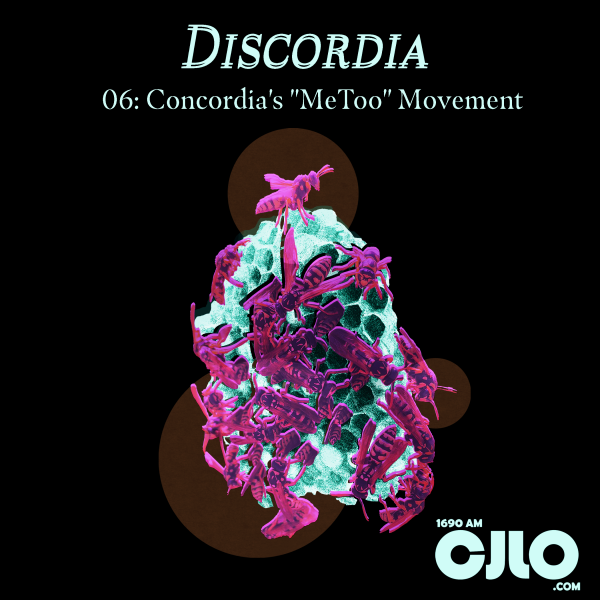
MeToo comes to Concordia's campus in early 2018 and kicks off a long struggle between students and the administration over the university sexual harrassment and assault policy. This episode explores the origins of the fight and looks at how it has student organizing shifts over the years.
This project is funded by the Community Radio Fund of Canada.
Art by James Fay

An Introduction to Othello Tunnels
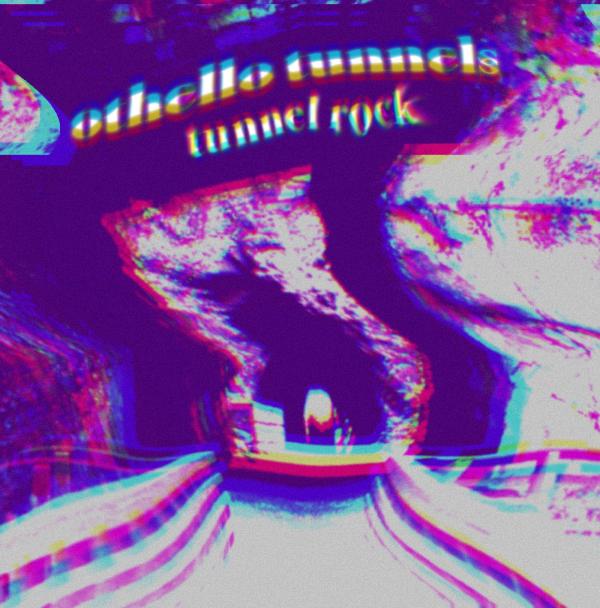
It is so refreshing to receive a new recording by a rock band in 2025 that is neither in the post-punk vein nor dripping with shoe-gaze reverb. That is not to say that either of those genres or the bands continuing to carry the torch are bad, it is just nice to hear something swimming upstream every now and then. Othello Tunnels could care less about musical trends and of-the-moment fads, and that is why they are a band to keep an eye on. Their style-blending sound - part glam, part psychedelic rock, a sprinkling of indie-pop and a whole lot of futuristic space blues - may just be the foreshadowing of what the next fad is. Someone’s got to get the ball rolling or turn the corner for another movement, right?
Formerly known as Linus Haze, a solo project originally created to bring to life the music of singer/guitarist Linus Heyes, until drummer Jophiel Paquet-Marsolais and bassist Gabriel Payeur came along.
“I knew within the first five minutes of us practicing, this was it,” said Heyes.
“It just came about naturally,” said Paquet-Marsolais. “Even now that’s what it is. Each session we practice the songs that we have, but we evolve them and something new comes from that.”
“We never try to force it,” said Payeur. “It’s crazy to me how much we are linked subconsciously. We’re gonna end the same part at the same time without even looking at each other, and that’s chemistry, you know. That’s why I like playing music with these guys.”
It was easy to see that this was no longer a solo project, it had suddenly forged into a fully formed band. Realizing this, Heyes convinced the other two for a name change. Thus Othello Tunnels was born.
“It’s a rebranding of something new, that we are all creating together,” said Heyes. “As opposed to what it was before when I was writing everything and bringing it to the guys and saying ‘Hey this is what we're gonna play.’ I want all of us to feel that it is our band equally.”
“That’s what I love about us, there is never any ‘We have to do this’ or ‘We have to do that’ it just comes about, and it’s been like that since the beginning,” said Paquet-Marsolais.
The name Othello Tunnels is taken from a series of decommissioned train tunnels through the Cascades mountain range in British Columbia, that are now part of the Coquihalla Canyon Trail system.
“It’s a park in BC, which I visited many, many times growing up as a kid and it always holds a certain place in my heart,” said Heyes. “In the next few years we’re all gonna go there, so we can all experience what it’s like.”
As the growing bond between bandmates evolved into a brotherhood, the music continued to flow out of all three. With this new cross-pollination to the songwriting, they knew they had to get these first songs out into the world.
“It’s all flowing in together,” said Heyes. “I want to write new stuff and I’m privileged to write it with these guys. We write it together and I’m happy with how it is sounding.”
Anyone who has had the pleasure of seeing Othello Tunnels live will tell you that the four songs on Tunnel Rock are merely scratching at the surface of what this band has to offer, but it is the perfect place to start.
“Easy 2 Love” gets things going and in just over four minutes will have all listeners swooning with the ethereal beauty of this guitar-driven ballad. Think of it as Heyes’ way to get you a slow dance with whoever you brought to the show.
“Highway” comes next with its hypnotic desert blues riffs and yearning for freedom. There is a long line, stretching back through the annals of rock and roll, that connects this song with the hazy bliss found in songs like Jimi Hendrix’s “Stone Free”, J.J. Cale’s lost masterpiece “Durango” or Kelley Stoltz’s “Put That In Your Pipe”. You can almost see the shimmering distortion waves rising from the road ahead of you.
“Tomorrows Time” with its shuffling rhythm section underneath Heyes’ soaring, psychedelic guitar work, might be the best example of what this early incarnation of Othello Tunnels is - a futuristic blues band, with one foot covered in the mud of the Delta Blues and one foot floating in space.
“White Roses”, the debut single that came out last year, is a glittering indie pop song, which rounds out the EP and shows a little more of what is possible from this three-piece. At the 1:47 mark, Heyes jumps into a solo that shows just how talented he is playing his guitar, without ever getting overbearing or obnoxious with it. The line, “I can’t help falling in love with you,” just might be a little foreshadowing for the listeners, who might not be able to keep themselves from falling for this band.
This might be where there should be a disclaimer made to protect the band from any litigation down the road, brought on by some unintentioned broken hearts. If you are planning to bring your significant other to bear witness to this exciting new power trio, be forewarned that before strutting his stuff on stage with his guitar, Heyes spent a few years strutting up and down the runway as a much in-demand model. It does not matter what your partner’s orientation is either, they are gonna notice those cheekbones.
Superficialities aside, Othello Tunnels is ready to take flight, and it would do you some good to get on board.
Listen to Othello Tunnels debut single, "White Roses", here
